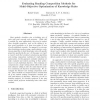Free Online Productivity Tools
i2Speak
i2Symbol
i2OCR
iTex2Img
iWeb2Print
iWeb2Shot
i2Type
iPdf2Split
iPdf2Merge
i2Bopomofo
i2Arabic
i2Style
i2Image
i2PDF
iLatex2Rtf
Sci2ools
118
click to vote
HIS
2008
2008
Evaluating Ranking Composition Methods for Multi-Objective Optimization of Knowledge Rules
Most symbolic classifiers aim at building sets of rules with good coverage and precision. While this is suitable for most applications, they tend to neglect other desirable properties, such as the ability to induce novel knowledge or to show new points of view of well-established concepts. An approach to overcome these limitations involves using a multi-objective evolutionary algorithm to build knowledge rules with specific properties specified by the user. In this paper, we report a research work that combined evolutionary algorithms and ranking composition methods for multi-objective optimization. In this approach, candidate solutions are built, evaluated and ranked according to their performance in each individual objective. Then rankings are composed into a single ranking which reflects the candidate solutions' ability to solve the multi-objective problem considering all objectives simultaneously. We investigate the behavior of 5 ranking composition methods. These methods are...
Evolutionary Algorithms | HIS 2008 | Information Technology | Most Symbolic Classifiers | Ranking Composition Methods |
| Added | 29 Oct 2010 |
| Updated | 29 Oct 2010 |
| Type | Conference |
| Year | 2008 |
| Where | HIS |
| Authors | Rafael Giusti, Gustavo E. A. P. A. Batista, Ronaldo Cristiano Prati |
Comments (0)

